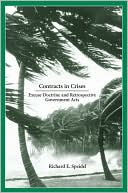 The most comprehensive analysis of the effect of government acts on performance of pre-existing contracts is found in the writings of Professor Richard Speidel. He referred to the problem as “retrospective” government acts, rather than “retroactive” to describe the legal consequences of acts that: “(1) impair certainty and stability by unsettling reasonable expectations and investments; (2) undermine the legitimacy of a justice system through seemingly arbitrary results; and (3) unexpectedly shift a public burden to a specific group who did not cause the underlying problem.” Professor Speidel argued that it is easier to obtain excuse for retrospective government acts where the act makes the contract either unenforceable or would result in direct governmental sanctions on the party performing because presumptions that the law will not change operate to satisfy the foreseeability element of excuse.
The most comprehensive analysis of the effect of government acts on performance of pre-existing contracts is found in the writings of Professor Richard Speidel. He referred to the problem as “retrospective” government acts, rather than “retroactive” to describe the legal consequences of acts that: “(1) impair certainty and stability by unsettling reasonable expectations and investments; (2) undermine the legitimacy of a justice system through seemingly arbitrary results; and (3) unexpectedly shift a public burden to a specific group who did not cause the underlying problem.” Professor Speidel argued that it is easier to obtain excuse for retrospective government acts where the act makes the contract either unenforceable or would result in direct governmental sanctions on the party performing because presumptions that the law will not change operate to satisfy the foreseeability element of excuse.To make his point, Professor Speidel used the example of homeowners that have five year fixed price contracts for gas supply at $3 per BTU. After hurricanes disrupt the gas supply in the area, the market price of gas is $6 per BTU. The government, in an effort to bailout the suppliers, deletes the fixed price term out of the consumer contracts in the area. Professor Speidel argued that the occurrence of the hurricane in all likelihood did not make performance excusable due to the fixed price nature of the contracts. The supplier is excused nevertheless due to the government act. Thus, the consumer must pay the higher market price for the gas supply.
Explaining this outcome, Professor Speidel turns to U.C.C. § 2-615 and notes that the foreseeability factor is satisfied in the government act cases under the direct language of the Code, leaving only the impracticability component of the test, unless issues of risk allocation are present. Comment 10, though, explains that “governmental interference cannot excuse unless it truly ‘supervenes’ in such a manner as to be beyond the seller’s assumption of risk.” The Comments to the Restatement further explain:
With the trend toward greater governmental regulation, however, parties are increasingly aware of such risks, and a party may undertake a duty that is not discharged by such supervening governmental actions, as where governmental approval is required for his performance and he assumes the risk that approval will be denied. Such an agreement is usually interpreted as one to pay damages if performance is prevented rather than one to render a performance in violation of law.
Speidel's concern with the use of ordinary contract principles to allocate the risk of retrospective government acts helped shape my recent paper on Impracticability Under the U.C.C. for Wartime Contracts. Although Justice Souter noted in United States v. Winstar Corporation case the humdrum nature of basic procurement contracts, wartime sales contracts in Iraq have turned out to be less than routine due to the hazards created by insurgents. I have argued that the strict application of traditional doctrine must proceed with caution regarding wartime contracts as they arguably exhibit the same differential in bargaining power noted by Professor Speidel. As such, the traditional rules are applicable to wartime contracts as they are to regulatory ones, but one must exercise care in the allocation of risks. Not surprisingly, Professor Speidel’s proposition is consistent with the comments to the Code, directing reference to equitable principles where excuse or no excuse does not lead to a satisfactory result. U.C.C. § 2‑615 cmt. 6 (2001). Although Professor Speidel's work did not answer, nor was it intended by him to answer, the specific issues raised by extreme personal hazards faced by contractors during wartime, his words guided my thought process. Although I did not personally know Richard Speidel, his work has influenced my own. I would guess that there are many who share my perspective on the impact of Dick Speidel's work.

No comments:
Post a Comment